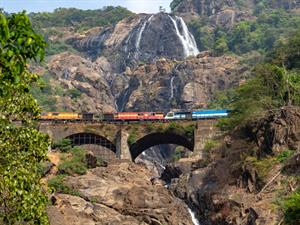
PUMPA - SMART LEARNING
எங்கள் ஆசிரியர்களுடன் 1-ஆன்-1 ஆலோசனை நேரத்தைப் பெறுங்கள். டாப்பர் ஆவதற்கு நாங்கள் பயிற்சி அளிப்போம்
Book Free Demo Passepartout, on waking and looking out, could not believe that he was actually crossing India in a railway train. The locomotive, guided by an English engineer and fed with coal, threw out its smoke upon cotton, coffee, nutmeg, clove, and pepper plantations, while the steam curled in spirals around groups of palm-trees, in the midst of which were seen attractive bungalows, viharas (sort of abandoned monasteries), and marvellous temples decorated by the rich work of Indian architecture. Then they came upon vast areas extending to the horizon, with jungles where snakes and tigers lived. These creatures fled at the noise of the train. Then they came to forests where elephants stood gazing with sad eyes at the train as it passed.
At half-past twelve the train stopped at Burhampoor. The travellers made a hasty breakfast and started off for Assurghur. Now they travelled along the banks of the small river Tapty, which empties into the Gulf of Cambray, near Surat.
Then towards evening the train entered the valleys of the Sutpour Mountains, which separate the Khandeish from Bundelcund. It was three in the morning.
Explanation:
When Passepartout woke up and looked outside, his eyes were filled with amazement. Jules Verne wrote the story during the railway built. It was when people started using the train newly as a means of transport, to cross huge distances. Passepartout started his train journey from Mumbai, had travelled throughout India by train. He could not believe the fact that he was crossing India on a railway train. The author had given a vast description of the engine of the train.
The English engineer had fed the train engine with coal which threw out the smoke upon cotton, coffee, nutmeg, clove, and pepper plantations. The steam that comes out from it looked like curled spirals around groups of palm-trees, in the midst of which were seen attractive bungalows. Those viharas (monasteries that left uncared) and marvellous temples were richly decorated with Indian architecture. Then they entered a huge area of jungles that stretched to the horizon. The jungles had been filled with snakes and tigers. The snakes and tigers were scared to hear the train's noise and so ran away. Then they reached a forest which had been filled with elephants. Those elephants looked sadly at the train with their fixed eyes while the train passed.
At half-past twelve, the train came to a halt in Burhampoor. Around this time, the travellers quickly finished their breakfast. Then the train restarted for Assurghur. They then travelled along the banks of the small river Tapty, which was flowing into the Gulf of Cambray, near Surat. Then, towards evening, the train entered the valleys of the Sutpour Mountains, which separate the Khandesh from Bundelcund. They reached Bundelcund at three in the morning.
The English engineer had fed the train engine with coal which threw out the smoke upon cotton, coffee, nutmeg, clove, and pepper plantations. The steam that comes out from it looked like curled spirals around groups of palm-trees, in the midst of which were seen attractive bungalows. Those viharas (monasteries that left uncared) and marvellous temples were richly decorated with Indian architecture. Then they entered a huge area of jungles that stretched to the horizon. The jungles had been filled with snakes and tigers. The snakes and tigers were scared to hear the train's noise and so ran away. Then they reached a forest which had been filled with elephants. Those elephants looked sadly at the train with their fixed eyes while the train passed.
At half-past twelve, the train came to a halt in Burhampoor. Around this time, the travellers quickly finished their breakfast. Then the train restarted for Assurghur. They then travelled along the banks of the small river Tapty, which was flowing into the Gulf of Cambray, near Surat. Then, towards evening, the train entered the valleys of the Sutpour Mountains, which separate the Khandesh from Bundelcund. They reached Bundelcund at three in the morning.

Mountain view from train
Meaning of difficult words:
S.No | Words | Meaning |
1. | Locomotive | The engine of a train |
2. | Steam | The hot gas that is produced when water boils |
3. | Abandoned | Left without care and protection |
4. | Horizon | The place in the distance where the sky and the earth seem to meet |
5. | Gaze | To look at something steadily with fixed eyes |
6. | Empties into | Flows into |
7. | Architecture | The art and practice of designing and making buildings |
Reference:
State Council of Educational Research and Training (2019). Term-3 English Standard-7. A Journey by Train by Jules Verne (pp. 79-85). Published by the Tamil Nadu Textbook and Educational Services Corporation.